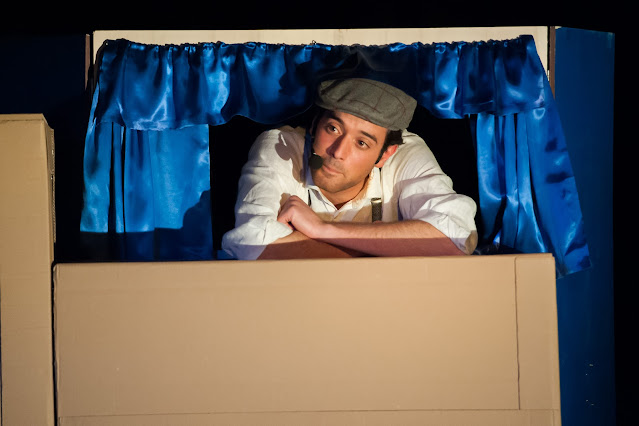Review: Fascism is No Fairy Tale in "WE, PUPPETS Story of a Life Shattered by Racism"
WE, PUPPETS Story of a Life Shattered by Racism (NOI, PUPAZZI Storia di una vita sconvolta dal razzismo)
Written and performed by Marco De Simone
Production Associate: Campania Danza
Presented at Casa Italiana Zerilli-Marimò at NYU
24 W 12th St, New York, NY
May 2 and 5, 2023
 |
| Marco De Simone. Photo by Nicola Niceforo. |
Lights come on, and the puppeteer comes in front of the puppet stage to introduce himself: His name is Saul Di Cori; he is 12 years old and lives in Riapino (a fictional town) in Campania, Italy. His passion is to entertain folks in his town’s square by having his puppets enact his improvised fairy tales. It’s June 1937, and Italy is under the regime of Mussolini, il Duce. We hear the radio broadcast snippets of hate speeches by il Duce, but Saul is too young to comprehend the looming implications for Jewish families such as his. Saul continues to enjoy a carefree life full of his puppet stories, laughter, and soccer games. His parents, however, are saddened by the radio announcements of new decrees intended to systematically strip Jews of their rights as Italian citizens.
Marco De Simone, as Saul, alternates between being the puppeteer behind the puppet stage and the child who highlights significant moments of his daily life against the grim political news broadcast in the background. Lights go off during the puppet shows and on during the soliloquies.
At 16 Saul is about to part from his puppets as he is embarking on a journey with 69 other Jews who, helped by a priest, hide in huts into the woods. His mother, knowing how meaningful the puppets are to Saul, realizes that he must take them along. Saul finds solace by staging his puppet shows during this time of dire circumstances: Big White Bear is shorn of his fur and tied up, but the hamsters, squirrels, and mice chew away the ropes that held him and set him free. Spillo (Squirrel) finally makes it to the ocean. But does reality mirror the happy ending Saul improvises for his puppets?
This was a sincere, passionate, even personal performance that uses history, metaphor, and innocence to tell a universal story of the price of hate and the plight of refugees. Echoing George Santayana’s aphorism, “Those who cannot remember the past are doomed to repeat it,” and resonating with today’s displaced and persecuted communities, Saul’s message was loud, clear, and so very heart-rending!
-Maria Ornella Treglia
More from our 2023 In Scena! coverage:
Review: "I Am So Much Better Live" Invites You to Take It at Its Word
Review: "Only Mozart is Missing" Scores a Family's History
News: In Scena! Italian Theater Festival Announces Collaboration with the Hystrio Award-Scritture di Scena
News: The 2023 In Scena! Italian Theater Festival Begins on May 1st



Comments
Post a Comment